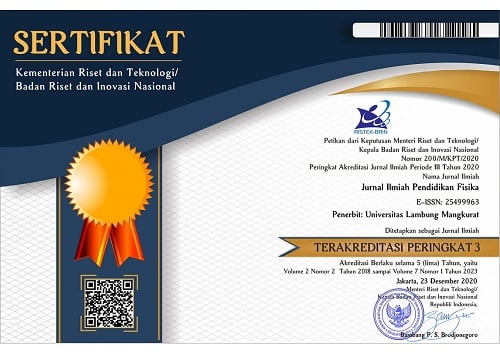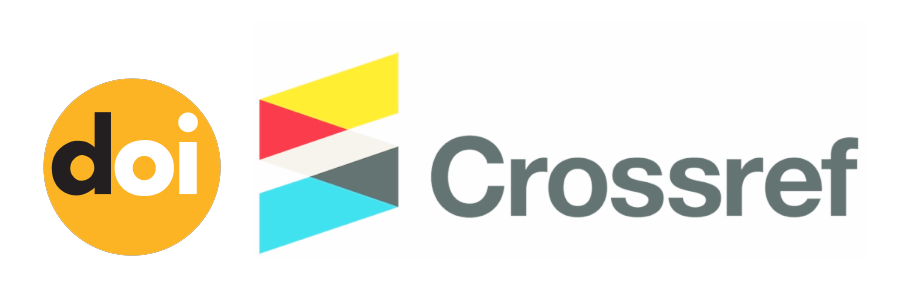Critical Thinking Skills Improvement of Students Through Guided Inquiry Learning Model with Scientific Approach
Abstract
The COVID-19 pandemic pushed many schools to create hybrid learning systems due to drastic changes in the learning environment. Technology and knowledge have advanced swiftly in the 21st century. As the foundation of education, the school is expected to foster students' 4C skills, one of which is critical thinking. This study aimed to analyze how students' critical thinking skills changed after studying harmonic motion using the guided inquiry model and scientific approach. The study used a quantitative method with the pre-experimental design's one-group pre-test post-test procedure. A 10-question essay was used to obtain data from 31 students in grade X IPA 3. The findings indicated that students' critical thinking skills improved, with an N-Gain score of 0.72. As well as implications for this study, there were significant differences in critical thinking participants were educated with the T-test sample pair after using the santific suppression with the guided inquiry model.
Keywords
Full Text:
PDFReferences
Aji, S. D., Bernadino, A., & Hudha, M. N. (2017). Inkuiri terbimbing dengan pendekatan saintifik (scientific approach) untuk meningkatkan berpikir kritis. Momentum: Physics Education Journal, 1(2), 140. https://doi.org/10.21067/mpej.v1i2.2148
Dewi, C., Astuti, B., & Nugroho, S. E. (2018). Kemampuan berpikir kritis siswa melalui pembelajaran discovery learning berbantuan bahan ajar fisika berbasis pendekatan saintifik. UPEJ Unnes Physics Education Journal, 7(2), 22–28. https://doi.org/10.15294/upej.v7i2.27464
Farindhani, D. A., & Wangid, M. N. (2019). Scientific-based pictorial storybook with project-based learning method for improving the critical thinking skills of elementary school students. Jurnal Prima Edukasia, 7(1), 94-105.
Hamdani, Prayitno, & Karyanto. (2019). Meningkatkan kemampuan berpikir kritis melalui metode eksperimen. Proceeding Biology Education …, 16(Kartimi), 139–145. https://jurnal.uns.ac.id/prosbi/article/view/38412
Hong, J. C., Hsiao, H. S., Chen, P. H., Lu, C. C., Tai, K. H., & Tsai, C. R. (2021). Critical attitude and ability associated with students’ self-confidence and attitude toward “predict-observe-explain” online science inquiry learning. Computers and Education, 166(February), 104172. https://doi.org/10.1016/j.compedu.2021.104172
Jonathan, D. A., & Effendi, I. (2020). Analisis pengelolaan dalam upaya menjaga tingkat likuiditas perusahaan bongkar muat (pbm) pt. tao abadi jaya jakarta periode tahun 2011-2016. Jurnal Ilmiah Manajemen Dan Bisnis, 1(April), 5–24. https://doi.org/https://doi.org/10.31289/jimbi.v1i1.366
Kanginan, M. (2013). Fisika Untuk SMA/MA Kelas X (A. D. W, Supriyana, & Syarifuddin (eds.); kedua). Jakarta: Erlangga. https://doi.org/98765
Kurniasih, Imas, & Sani, B. (2017). Ragam pengembangan model pembelajaran untuk peningkatan profesionalitas guru (CV. Solusi Distribusi (ed.); Cetakan Ke). Yogyakarta: Kata Pena.
Lieung, K. W., Rahayu, D. P., & Fredy. (2020). Scientific approach to improve the critical thinking skills. Education and Humanities Research, 473(Icss), 480–483. https://doi.org/10.2991/assehr.k.201014.105
Misbah, M., Mahtari, S., Wati, M., & Harto, M. (2018). Analysis of students' critical thinking skills in dynamic electrical material. Kasuari: Physics Education Journal (KPEJ), 1(2), 103-110.
Muazizah, N. M., Nurhayati, S., & Cahyono, E. (2016). Keefektifan penggunaan e-learning berbasis moodle berpendekatan guided inquiry terhadap hasil belajar siswa. Jurnal Inovasi Pendidikan Kimia, 10(2), 1760–1768.
Rahmat, R., Suwarma, I. R., & Imansyah, H. (2019). Penerapan model pembelajaran problem based learning berbasis multirepresentasi untuk meningkatkan kemampuan berpikir kritis siswa sma pada materi getaran harmonik. Prosiding Seminar Nasional
Fisika (E-Journal) SNF 2019, 8, SNF2019-PE-101–106.
https://doi.org/10.21009/03.snf2019.01.pe.13
Rhosalia, L. A. (2017). Pendekatan saintifik (scientific approach) dalam pembelajaran tematik terpadu kurikulum 2013 versi 2016. JTIEE (Journal of Teaching in Elementary Education), 1(1), 59. https://doi.org/10.30587/jtiee.v1i1.112
Ristanto, R. H., Djamahar, R., Heryanti, E., & Ichsan, I. Z. (2020). Enhancing students’ biology-critical thinking skill through CIRC-Based scientific approach (Cirsa). Universal Journal of Educational Research, 8(4A), 1-8.
Saregar, A., Cahyanti, U. N., Misbah, M., Susilowati, N. E., Anugrah, A., & Muhammad, N. (2021). CORE learning model: Its effectiveness towards students' creative thinking. International Journal of
Evaluation and Research in Education, 10(1), 35-41.
Septikasari, R. dan R. N. F. (2018). Keterampilan 4c abad 21 dalam pembelajaran pendidikan dasar. Jurnal Tarbiyah Al Awlad, VIII, 107–117. https://doi.org/https://onesearch.id/Record/IOS15151.article-1597
Siahaan, F. E., & Pane, E. P. (2021). Penerapan pendekatan saintifik berbasis model pembelajaran guided inquiry untuk meningkatkan soft skills mahasiswa pendidikan fisika. Jurnal Basicedu, 5(4), 2541–2549. https://doi.org/10.31004/basicedu.v5i4.1230
Sudarmaji, H., Prasojo, G. L., Rubiono, G., & Arif, R. (2021). Pendidikan vokasi aviasi: Peluang dan tantangan. SKYHAWK: Jurnal Aviasi Indonesia, 1(1), 1-6.
Sugiyono, S. (2019). Metode penelitian pendidikan (kuantitatif, kualititatif, kombinasi, R&D, dan penelitian pendidikan) (A. Nuryanto (ed.); Edisi Keti). Bandung: Alfabeta.
Sukini, S. (2019). Penerapan pembelajaran guided inquiry berbasis pendekatan saintifik untuk meningkatkan aktivitas dan hasil belajar kognitif biologi siswa kelas xi mipa sma negeri 3 dumai. Journal of Natural Science and Integration, 2(1), 105. https://doi.org/10.24014/jnsi.v2i1.7118
Sukma, S., Komariyah, L., & Syam, M. (2016). Pengaruh model pembelajaran inkuiri terbimbing (guided inquiry) dan motivasi terhadap hasil belajar fisika siswa. Saintifika, 18(1), 59–63.
Surya, Y. (2009). Seri bahan persiapan olimpiade fisika getaran dan gelombang (Tim PT Kadel (ed.); Pertama). Tanggerang: PT Kadel.
Yani, M., Mastuang, M., & Misbah, M. (2021). Development of solid elasticity modules with guided inquiry model to train critical thinking skills. Kasuari: Physics Education Journal (KPEJ), 4(1), 44-56.
DOI: https://doi.org/10.20527/jipf.v7i1.6255
Refbacks
- There are currently no refbacks.
Indexed by: Jurnal Ilmiah Pendidikan Fisika is licensed under a creative commons attribution-share alike 4.0 international license
Statistics Counter |
















